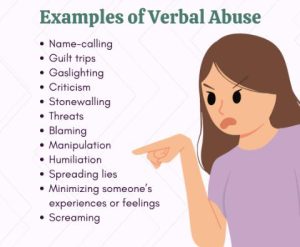By Bashirat Durojaye

Verbal abuse is a way of hurting others, using words or silence as a weapon. Unlike physical abuse, verbal abuse doesn’t manifest in broken limbs, black eyes, or bruises but its impact can be equally emotionally distressing, often resulting in feelings of anxiety, fear, despair, or depression.
Verbal abuse (also known as verbal aggression, verbal attack, verbal violence, verbal assault, psychic aggression, or psychic violence) is a type of psychological abuse that involves the use of oral, gestured, and written language directed to a victim.
Verbal abuse can encompasses actions such as harassing, labeling, insulting, threatening , name-calling, Bullying, bad mouthing, criticizing, defaming, blaming, berating or excessive yelling at an individual.
It may also involve using derogatory terms, or making statements intended to frighten, humiliate, denigrate, or belittle a person.These attacks may result in mental and emotional distress for the victim, leading to psychological damage, emotional and physical harm to the victim.
This abuse can come from anywhere (e.g home, school, workplace, peer pressure or from spouse) When verbal abuse is particularly severe, it can impact whether or not people can see themselves as being successful in any area of life.
Those who experience verbal abuse as children may experience feelings of worthlessness, difficulty trusting others, shame, stress, depression and anxiety, inferiority or low self-esteem, intrusive memories, anger issues, doubt, guilt, personality disorder and problems regulating their emotions as adults.
steps you can take to minimize the detrimental effects of verbal abuse include; setting boundaries with others, practice emotional self-care, limit interaction with the abuser, honour your self and your feeling, protect your peace, safe space and your mental health.
Learn to Recognize the Abuse: The first step is to recognize the abuse for what it is. Verbal abuse can take many different forms,The most easily identifiable forms of verbal abuse include name-calling and extreme angry outbursts. Harder-to-recognize forms include mocking, belittling, ridiculing, evading questions, sarcasm, confusion, inappropriate silence, and inappropriate criticism and attack.
Respond Forcefully: Once you have recognized the abuse, the next step is to attempt to change the situation by making your abuser aware that they are verbally abusive. Their verbal abusive behavior may in rare instances be grounded in extreme ignorance, and a simple conversation should then be able to put an end to the abuse. But in most cases, you can’t reason with your verbal abuser.
Spend Time Away From Your Abuser: When you are not in a position to permanently part ways with your abuser like parents, or spouse, find ways to cope until you can. Work on becoming independent of your abuser and continue to respond with force to every instance of the abuse. To shield your emotional and physical health, spend time away from your abuser as much as possible.
Don’t Keep the Abuse a Secret: Because you don’t have any visible proof of the abuse, you may be wary of confiding in others. You may doubt that others will believe you. You may even be unsure of whether what’s going on really is a kind of abuse. Perhaps you are thinking that there is something wrong with you and not your abuser,
Don’t let any of these reasons prevent you from letting other people know what’s going on. The people you trust are going to be on your side. They are not going to doubt you or think that you are the source of the problem. Bury your reasons for keeping the abuse a secret and get the support you need from close friends and family members and seek professional counseling from someone specifically trained to handle verbal and emotional abuse.
